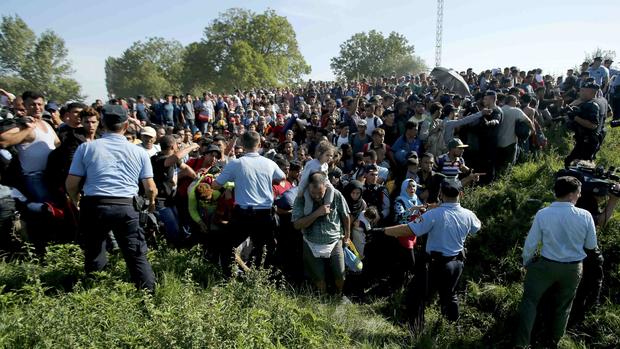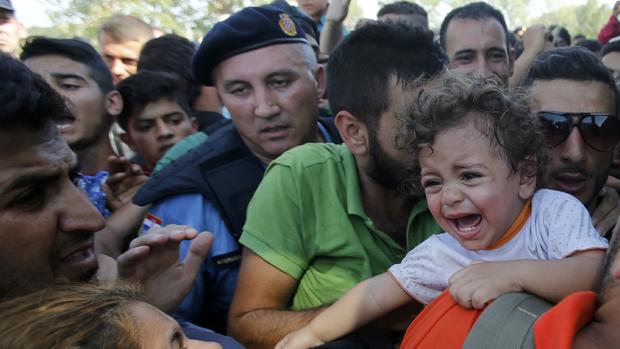Seeking new route, migrants beat down Croatia's door
TOVARNIK, Croatia -- Thousands of people were pouring into Croatia on Thursday, turning it into the latest hotspot in the 1,000-mile plus exodus toward Western Europe after Hungary used tear gas, batons and water cannons to keep migrants out.
By Thursday morning, Croatian police said 6,200 people had entered the country since the first groups started arriving early Wednesday.
Hundreds of migrants pushed through police lines in the eastern Croatian town of Tovarnik, with people trampling and falling on each other amid the chaos.
An Associated Press photographer saw a man collapsing on the ground and dozens injured in the melee.
More than 2,000 men, women and children were stuck at the local train station for hours in blazing heat and sun on Thursday, waiting to board trains and buses for transport to refugee centers.
When buses arrived, groups charged toward them, overwhelming the Croatian police who unsuccessfully tried to contain the crowd. After the situation calmed, groups of migrants moved off on foot, with police unable to stop them.
Croatia represents a longer and more arduous route into Europe for the asylum-seekers from Syria and elsewhere fleeing violence in their homelands. But they have little choice after Hungary sealed off its southern border with Serbia and began arresting anyone caught trying to enter illegally.
CBS News correspondent Charlie D'Agata has followed the flood of migrants for weeks, and watched Wednesday as Hungarian police unleashed tear gas on hundreds of people, including small children and pregnant women, along the border with Serbia.
On Thursday, United Nations human rights chief Zeid Ra'ad al Hussein called the Hungarian government's handling of the crisis "callous" and said it included "clear violations of international law."
"High Commissioner Zeid deplored the xenophobic and anti-Muslim views that appear to lie at the heart of current Hungarian government policy," said the statement released by the U.N. agency.
Croatian Interior Minister Ranko Ostojic, who said earlier that the country had the situation under control, warned that "if huge waves start coming through Serbia, we must consider different moves."
He told reporters 6,500 migrants had entered Croatia in just 24 hours. "Croatia will not be able to receive more people," Ostojic said in Tovarnik.
The migrants are unlikely to stay long in Croatia. Most plan to travel on, passing through Slovenia and then Austria en route to Germany or the Scandinavian countries. Croatian Foreign Minister Vesna Pusic said the country "cannot force anyone to stay."
By noon, some 3,000 migrants grew restless as they waited in blazing sun at the train station in the eastern town of Tovarnik that has been Croatia's the main entry point. Smaller groups started walking along the rail tracks, but police turned them back, promising that a train would be there soon.
Hundreds of other asylum seekers came over a Danube River bridge to the northern Croatian town of Batina after being bused there by Serbs, overwhelming the local police.
Fearing a surge of migrants from Croatia, Austria and Slovenia called Thursday for an urgent, all-EU response. Both have reinstated border checks.
"We are being put to test" said Austrian Chancellor Werner Faymann. "This time we must prove that we don't want a Europe in which everyone will try to shift their problems to others' shoulders."
Slovenian PM Miro Cerar insisted his country will protect the European Union's visa-free travel zone, but did not specify what measures government would take.
Hungary has stirred up more political angst in Europe by saying it planned to build more fences along its borders, this time with Romania and Croatia. Romania responded with alarm Thursday after Hungary said that fence would be 43 ½ miles long, saying that would violate European standards.
Clashes between migrants and Hungarian riot police broke out Wednesday afternoon after people frustrated at being blocked from the country pushed open a gate at the Horgos border crossing with Serbia. Baton-wielding police responded with tear gas, pepper spray and water cannons, and migrants threw rocks and other objects at them. Dozens were injured.
Hungarian Foreign Minister Peter Szijjarto lashed out Thursday against the strong criticism the country has faced internationally - including comments from U.N. Secretary General Ban Ki-moon, who called Hungary's response unacceptable.
"I find it bizarre and shocking that certain esteemed international figures have stood on the side of people who for hours were throwing stones and pieces of cement at the Hungarian police," Szijjarto said. "And I'd also like to make it very clear, no matter what criticism I receive, that we will never allow such aggressive people to enter Hungary. Not even for transit purposes."
Hungarian police said they detained 22 people, including one Syrian man who they said was an organizer of the attacks at Horgos who is now suspected of terrorism.
The European Union's migration commissioner, Dimitris Avramopoulos, declared Thursday that walls and violence are no solution and urged Hungary to work with the 28-nation bloc to alleviate the continent's migration crisis.
"The majority of people arriving in Europe are Syrians," Avramopoulos said at a news conference alongside Szijjarto in Budapest. "They are people in genuine need of our protection. There is no wall you would not climb, no sea you wouldn't cross if you are fleeing violence and terror. I believe we have a moral duty (to) offer them protection."
Hungary, in contrast, has been insisting that most are simply economic migrants seeking better jobs. Prime Minister Viktor Orban has also said that by keeping out Muslims, Hungarian police are defending "Europe's Christian culture."
Avramopoulos countered that he considered it a "Christian duty" to handle the migration crisis with compassion.
Overnight, Hungarian authorities positioned barbed wire and a new gate at the Serbian border near Horgos. Still, that did not deter everyone.
About 30 young Afghan men waited Thursday on the Serbian side for a chance to cross the razor-wire fence, although their chances appeared remote as Hungarian police officers patrolled nearby.
Zahed Chakari, an 18-year-old from Kabul, said his group was waiting for instructions from their smuggler on what to do or where to go next.
"We will stay here until we cross the border. There is no alternative," he said, adding that four women traveling with him had already been shot dead earlier by Iranian forces when the group crossed into Turkey.
Most asylum seekers, however, were giving up on entering Hungary, leaving by bus, taxi or on foot for Croatia. Some chanted sarcastically "Thank You, Hungary!" in the direction of the Hungarian border guards. Small groups also staged sit-in protests before the Horgos border gates.
In Paris, French authorities evacuated more than 500 Syrian and other migrants from tent camps and moved them into special housing as the country steps up its efforts to deal with Europe's migrant wave.
Social workers woke the migrants before dawn, and they gathered their belongings calmly, watched over by police. The operations took place at a large camp near the Gare d'Austerlitz train station in southeastern Paris, and another in the 18th arrondissement in northern Paris.

